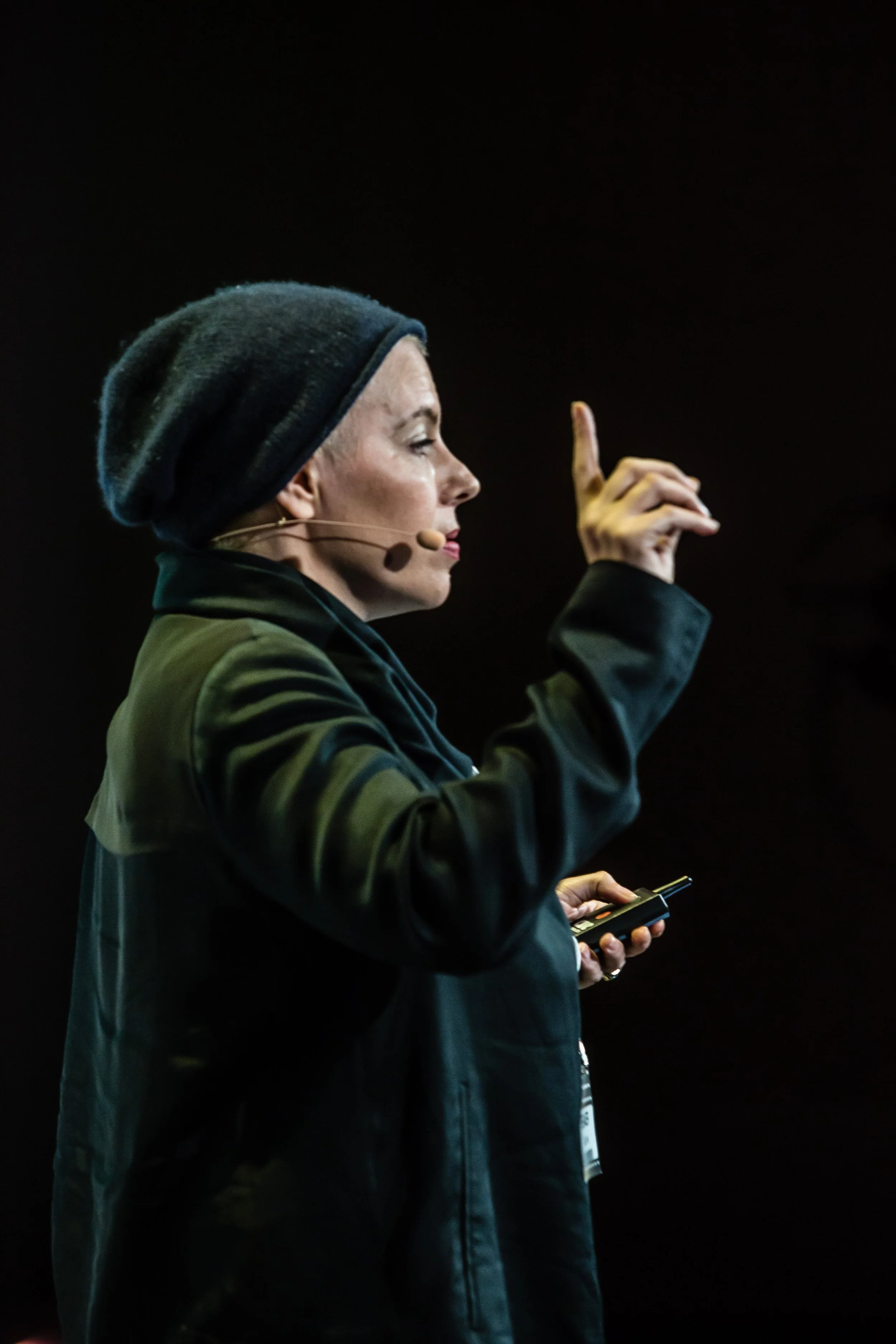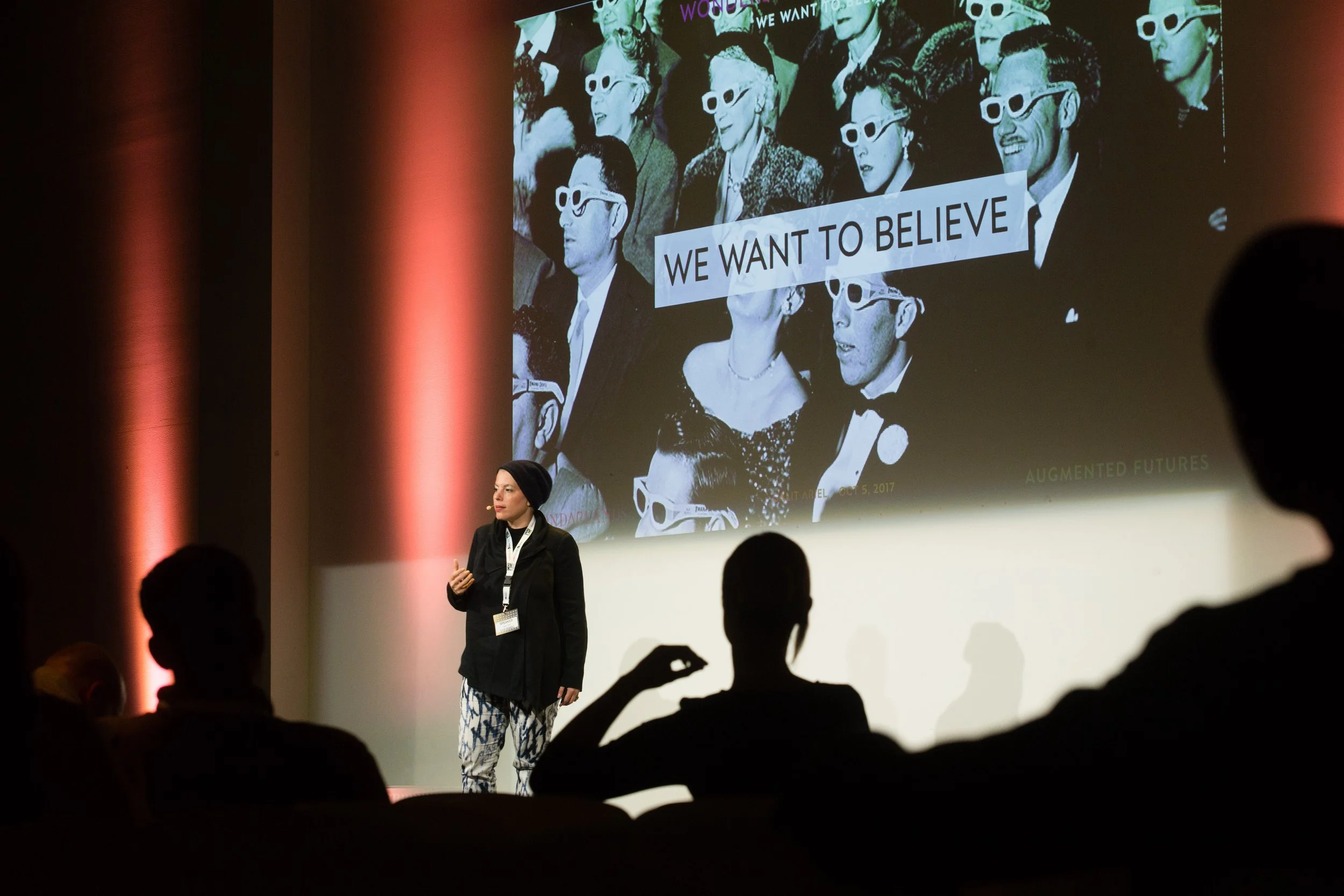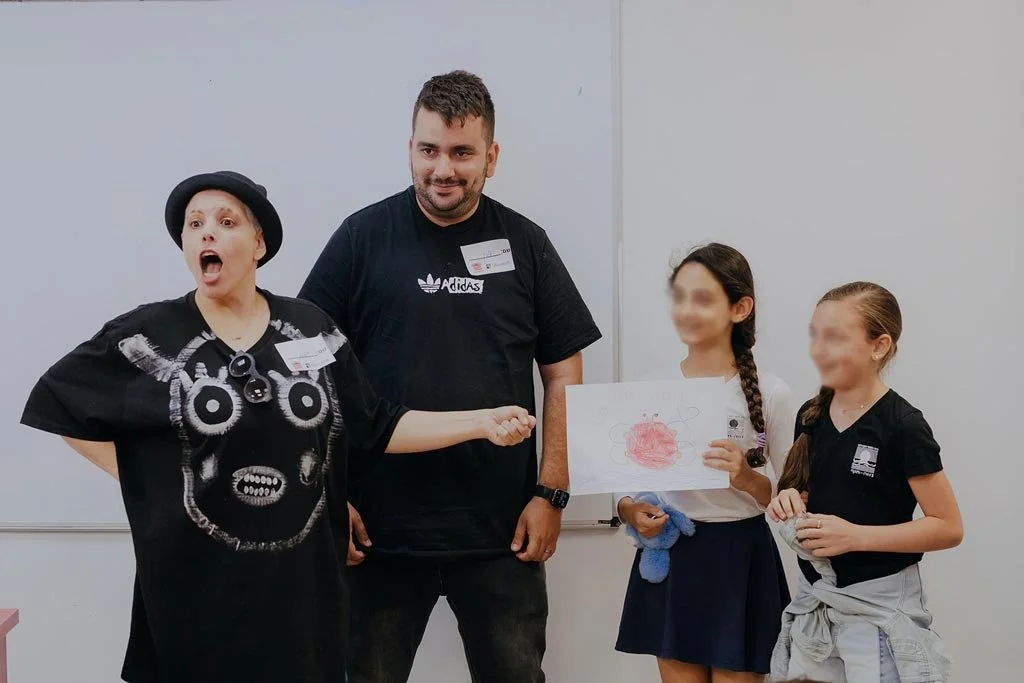Galit Ariel On How Emerging Technologies May Both Mitigate Or Accelerate Climate Change
Galit Ariel is a TechnoFuturist, author and an award-winning creative, exploring the wild and imaginative side of bleeding-edge technologies through her practice.
Her award-winning work spans across location-based AR art, subversive animation, alternative interactions, and art curation. She is the founder of Future Memory Inc.–a speculative design agencyco- creating tech futures for leading tech platforms, organisations, and policymakers. She is a sought-after speaker, curator and innovation facilitator for global conferences, organizations and think tanks (such as TED, SXSW, Slush, The European Union, Bell Labs, Microsoft, THE150 and many more).
Galit discusses exploring the future of how technology and humans influence each other, and why focusing on mixing the digital and the physical will create a new hybrid experiential space.
Highlights from the interview (listen to the podcast for full details)
[Sarah Ripper] - To start off, could you please share a bit about your background and what led you to where you are now?
[Galit Ariel] - I will flaunt the fact I was born a nerd. As a kid, I was the science fiction loving nerdy kid; I still am, to be honest. This is where my infatuation with people, spaces and technology melded together. My career path seems quite non-linear to some people, but for me it makes complete sense. It gave me the vital essence to be able to understand the passage of technology across physical and digital spaces, cultures, and society. I started off as an industrial designer, graduating from Central Saint Martins in London. I worked for seven years after as a designer in Milan, and that helped me to understand the ideas behind physical spaces, aesthetics, and purpose. This is important because tangible artefacts have a tangible cost. They occupy space, but it's clear to us what we get in exchange, whereas with technology it is not always the case. But after that I shifted into the creative aspects of brand and experience design while living in Amsterdam, and that helped deepen my understanding of cultural context and how humans experience spaces. Eventually I moved into human, computer, and digital interaction, which cemented where I'm at now, looking at emerging technology and how it is significant to our society and futures. We also look at how culture, behaviour, artifacts, and spaces make new technologies.
Currently I'm living in Toronto, and I have my own consultancy, but I also research immersive spaces in relation to body and identity through a PhD project I'm doing. I create immersive and digital content exploring social and political paradigms, and help clients understand how technologies and societies can come together. I come together at the intersection of research and creation, physical and digital, which allows me to understand better technological futures (futures is plural, there is no one future). Don't believe a futurist who tells you they know what the future will be; there are possible futures ahead of us and there are things we need to do to get there or not, to get to another.
What concepts should people understand when it comes to considering potential outcomes in our future?
I love being titled a ‘digital hippie’ because it speaks to my approach with technology. I love technology, I really do. By loving it, it means I'm not in love with it. I can be critical towards it, understand it and love it despite its flaws. I am critical about how we implement it, but I'm also hopeful we can fix the harms we've done by making better technologies we deserve. In terms of what future potentials people will benefit from thinking about, two main things are important to change the plethora of issues we have because of harmful, malicious, and nonsensical applications of technology. The first one is to recalibrate and ask why we are creating technologies? Why are we making technology? Is it just because we can? Sure, that is a reason, but it can't be the only reason. The second question is what are the consequences of technologies incoming at a growing pace? I think we're during a tech spiral where we make more and more technology, and the new trends don't even hold a year. Every three months there's a new technology coming in, and we can do amazing things today which nerdy tech kids and adults are super excited about. But somehow, we're not sure why we're doing it. Even if you can do this, why do we need to do this? This question is gone from our vocabulary. Why are we doing this? Do we need it? Is it really solving a problem? You can make money of course, it's an industry. But besides that, what is it giving to society? I'm fine of course with people profiting from tech, but when it becomes the only goal, it's also harming technology and innovation.
Something new is not innovation. Innovation is the ability to change systems for the better. Normally, this involves building on systems we have instead of reinventing them to be quicker, faster, and shorter. We have lost the plot in our relationship with technology.
We have lost control over what societal and ecological damage technologies create and what societal and personal harm they can carry. Are they solving problems, why are we doing it, and what are the consequences? What is the payoff?
Can you tell us a little more about the ways technological progress has looked in the past and what else is possible in those spaces?
I want to first highlight how a lot of the time we ourselves get the terminology wrong. When we think about crypto, generative AI and the metaverse (I normally don't say that name out loud because if it is said three times it might become real) these are not technologies. These are platforms of existing technologies, of digital currency, blockchain, AI, immersive and spatial computing. These platforms, crypto, NFT’s, generative AI, and the metaverse are in my mind the epitome of these possibilities. These technologies are interesting for sure, very exciting to some people, but we don't know why we are creating them, and they are costing a lot. I'll start by talking about these costs because that's one of the things least discussed about. These technologies use very complex algorithmic calculations to attach certificates to digital artwork or create a fake digital currency attached to a hamster or a dog. All the amazing technologies where you can do your PowerPoint presentation 'in 3D with a PowerPoint' (I'm mocking it a little bit because these are the showcases, I've seen so far) they consume immense amounts of energy.
This immense amount of energy usage people are not talking about it. They are still relatively small, and if only one of them such as cryptocurrency become common practice, the crypto global crisis and climate crisis will become linked. Crypto assets alone annually use electricity in the amount between 120 and 240 billion kilowatts. It exceeds the total annual electricity usage of individual countries, and that's just for trading invisible coins. These technologies are literally melting the ice caps. It's absurd, and they're not solving a problem. They might solve inconveniences for some people, but they're not solving a problem, and not at the level which is worth the collapse of our planet. It's absurd, it’s like something you would read in a science fiction story and say, "oh, these people are idiots."
I must differentiate between these applications and the technologies themselves. Blockchain is a great technology when talking about securing assets, having many contracts and transactions.
Digital currency is amazing, we've been using it for years as most of us don't carry coins, bills, and notes. Immersive technology is amazing, but we don't necessarily need to have a 3D branded shopping mall to experience our bodies in other spaces. It's the difference between looking at nuclear science and the nuclear bomb; they're both using the same physics, one can be used for multiple things including clean nuclear energy but the other falls on and affects all of us (and what is left behind is not very desirable). I don't mean to offend anyone, I know people are passionate about this, but crypto is a ridiculous pyramid scam. Crypto is not money, there are so many books, literature, and economics to listen to about it. If it's a currency, it's the most volatile, hard to monitor and extractive, and it's not concerned with the distribution of wealth. NFTs are not for rewarding artists. The only good thing they've done is put forward the fact digital art is valuable, but it also diminished the idea of creativity and art by turning it into a tradable product. With generative AI, I don't know what problem we're solving with not having to be creative because it's ‘so tiring’ except putting creatives out of work and stealing their original work to regurgitate new creative artsy photocopies. I'm not impressed at all, especially not while all these technical quirks are diverting resources from technologies that can solve hard problems; improving agriculture and health which is where our money should be primarily spent. This is not just in the terms of private money, but government money. We have so much money going into start-ups, and these start-ups eventually aspire to being sold to big corporations. The public is paying for the research and development of technologies which are then used against them to monetise their products. This is the hard part of what's happening. This industry creates great products, but mostly results in suffering from a hyper capitalistic identity crisis, so it stops living up to its potential. It lives only up to how big it can become, and this is not what I want for my loved one.
I love technology, and what I'm struggling most with (especially as someone in the industry of creating spaces for better practices with technology) is how do we engage with policymakers, people in industry and the users of technology, when they're never at the table?
They're never sitting at the table when you have technology boards, it's technology and finance people sitting together telling us how great technology is for us. There isn't a real dialogue or understanding of what we need, what we want, and what we should have at least sponsored and endorsed publicly by people who do in their private equity endeavours what they want.
Elon Musk, who is talking about what an entrepreneur he is at SpaceX, used technology and finance from NASA because they are interested in civil space exploration. He’s considered outlier or genius, which he is not. He's leveraging public knowledge and government funding to set up a satellite network around our earth. I wish more people would talk about it. I don't want people to just be angry, but critical about the industry, because this form our social, climate and financial systems in the future. It's no longer just this industry that does things, it's integrated with everything we do every day, all day long, whether we are aware of it or not.
What inspiring projects or initiatives have you come across recently which you feel are creating a positive social change?
Two of my favourite positive impact companies were created a while ago. Wikipedia is one of them, this is my answer when people ask me to show them a technological product that is democratising and not about money. Wikipedia, which was mocked when it came out, became such an important cultural source of open access to knowledge. It is self-monitored, not for profit, and what the internet can and should be about.
Ben and Jerry's besides the fact of having wonderful ice cream is a company that for so long have stood up for social value and equity, not just donations but through the advertisement of their own products. I love it when things are applied to not just doing equity board hiring and green technology. I love to see companies do it, and very few do it in a way that is balancing out everything else they're doing. There are a lot more I want to say advocates for ethical technology, some of them are joining the hype of saying, "it should be ethical, let's do a metaverse ethics board with old white men to tell us how to make an open metaverse!" It's bizarre, there are individuals sacrificing and speaking up like Timnit Gebru from Google, she was a lead AI scientist and researcher that spoke up against practices they were developing and got fired. I'm also seeing governments and non-profits rising. I'm a lot more optimistic about governments’ the EU just came out with very quick legislation (or an adaptation of existing AI legislation) to add clauses regarding generative AI. It's a lot more reactive and responsible. In Australia alone there's a lot of work being done in terms of implementing AI ethics and laws. The National AI Centre is doing phenomenal work in researching, reporting, and bringing the industry into this conversation. I am optimistic, I'm a hippie, and I believe we can be better!
To finish off, what books or resources would you recommend to our listeners?
For books I always recommend science fiction. It teaches us so much about future and existing frictions. It's all been written already, and if you're going to read science fiction, my go to since forever is The Hitchhiker's Guide to the Galaxy by Douglas Adams. I am bit of tongue in cheek towards technology and how we think about it. It's a funny series of books and characters, but it's deep and philosophical when you peel back the layers and understand the concepts there. There's a great book called Invisible Planets I finished reading twice now. It's a collection of short science fiction stories from Chinese authors. It's interesting to read science fiction from a different cultural lens, because it was so Western and Hollywood focused until recently.
For recommending resources, people are always the best resource ever! I'm not talking about reality shows; watch how people around you interact and react when they meet technology. Have a second look at what's happening to you when you use it. If you do work in technology, please talk to people from outside the field. I know you work in tech, and these are the people you know, but step outside, talk to people, and ask them, what are they scared of? what do they like and what do they need? The Silicon Valley bro culture is just not going to give us anything worth having in tech, not anymore. If they do, they won't consider the costs; that is, what it will cost the rest of us.
Initiatives, Resources and people mentioned on the podcast
Recommended books
Hitchhikers Guide to the Galaxy by Douglas Adams
Invisible Planets by Ken Liu









